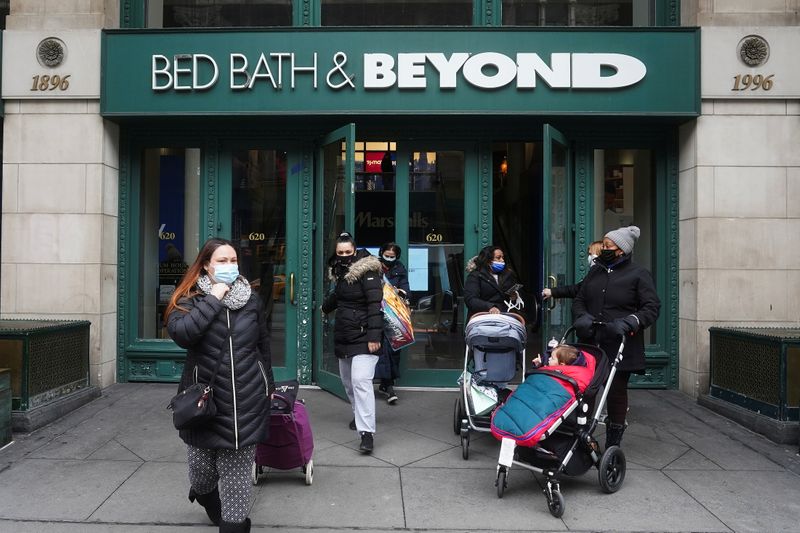© Reuters. FILE PHOTO: People walk out of a Bed Bath & Beyond amid the coronavirus disease (COVID-19) pandemic in the Manhattan borough of New York City, New York, U.S., January 27, 2021. REUTERS/Carlo Allegri
By Dietrich Knauth
NEW YORK (Reuters) – A U.S. bankruptcy judge on Tuesday approved Overstock.com (NASDAQ:)’s $21.5 million purchase of Bed Bath & Beyond (OTC:)’s brand name, intellectual property and ecommerce platform.
U.S. Bankruptcy Judge Vincent Papalia approved the sale at a court hearing in Newark, New Jersey, saying that he was “gratified” to see a bidder emerge that would preserve Bed Bath & Beyond’s brand.
Overstock emerged as the winning bidder for the company’s intellectual property in a deal worth $21.5 million, court filings showed on Thursday. Bed Bath & Beyond stores and inventory are not part of the deal.
Once a storied retailer, Bed Bath & Beyond filed for Chapter 11 bankruptcy protection in April after struggling for years with dwindling sales and a failed merchandising strategy.
Bed Bath & Beyond is hosting a separate auction starting tomorrow for its Buy Buy Baby chain, which sells products for infants and toddlers. The Buy Buy Baby assets have attracted interest from investment firms Go Global Retail and Sixth Street Partners, according to media reports.
Bed Bath & Beyond is also making good progress in winding down its store footprint, and it is finalizing hundreds of lease transfer agreements after a successful lease auction yesterday, the company’s attorney, Emily Geier, told Pappalia.
Bed Bath & Beyond’s negotiations with its lenders have not gone as smoothly, and the company will be back in court tomorrow to defend the $240 million loan it took out at the start of its bankruptcy case. A group of junior bondholders alleged Tuesday that the bankruptcy loan was based on inaccurate financial information, causing Bed Bath and Beyond to borrow more money than it needed and eroding potential repayments for junior creditors.
The company’s lawyers defended the bankruptcy loan, saying that it was negotiated in good faith and provided necessary funding for an organized sale of its assets.
Read the full article here





